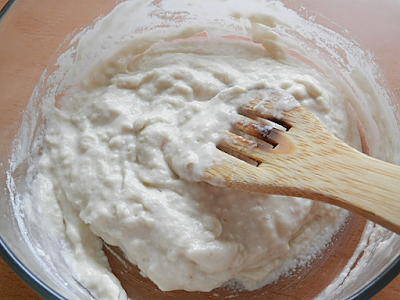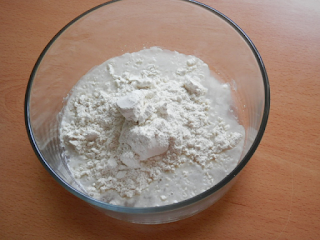Scalded flour (Poolish) is a natural dough improver used by the Scandinavian to boost the texture and taste of their breads.
It terms of functions, it is similar to Tanzhong but the difference is in the way both dough conditioners are prepared.
For the Scalded flour you’ll need:
– 100 gr Bread Flour/Plain flour
– 100 ml boiling hot water
Steps
1. Pour all the boiling hot water into a bowl containing the 100gr bread flour.
2. Stir the mixture quickly until well combined, then cover with a lid or cling film and leave to cool to room temperature(this takes about 1 hour depending on the weather)
When the the batter cools , use as desired.
 |
| Cooled scalded flour ready to use |
Don’t worry if the dough looks rough, after 1 hour the flour would have absorbed all the water and look smoother.
Tip: the scalded flour is usually left for 12 hours before use, but I followed Cornercafe’s tip and always get a good result if I use it after 1 hour.
To understand the science behind this method, please visit Hadyn of Thebreadmaiden and Zita of Thesourdoughlibrary , these ladies couldn’t have explained it better.
Here,s a soft chewy white bread I made with scalded flour





Thank you for your recipe. For bread flour of 50kg, what ration of flour and water should I use for scalding? Thank you for your anticipated response
Author
Hi Pst Jude Denedo,
If I understood you right,
you are trying to prepare scalded flour using 50 kg of Bread flour.
If that’s the case, then you’ll need about
1 litre of boiling water for every 1 kg of bread flour.
Hi, I just tried your recipe and it’s great. Can you kindly share your recipe for wheat bread for those who can’t eat bread flour or all purpose flour. Thanks
Author
Yes MissH I will surely do and thanks for the feedback .
Hi, I just discovered your website. I have been craving Nigerian bread for a while and decided to search for a recipe. I just made the scalded dough and it doesn’t look anything close to the picture you put up. Its hard like play dough just like someone mentioned. Could you pls review the recipe?
Author
Hi Lara,
good to have you here.
The scalded flour recipe is correct hun, but I just added some extra tip to help you better.
The scalded flour should look like a thick sticky stiff dough, not really as tough as a playdough.
If you get a tough texture, all is not lost.
You can add more liquid in the bread making process to cover up for the extra toughness.
After discussing with my baking friends, we have to agree that weather( both heat and humidity)
does play a big role in baking and usually affect theflour and liquid content.
So if you notice that the scalded flour isn’t as you saw in the recipe
simply add about 25ml water to the batter and leave to rest.
Hope this helps. Happy bread making.
100grams bread flour and 100milliliters water?
Author
Yes
When I measure and use 100grams of bread flour and 100 milliliters or water my scalded flour comes out much dryer than your picture. Its the consistency of play dough even after waiting 6 hours. Is a nigerian gram and a American gram the same? Sorry if thats a silly question but I cant figure out what im doing wrong.
Please madam,how do I measure or regulate the quantity of scalded flour in commercial production… Is the 100g and 100ml still applicable in large volumes of flour,example 25kg???
Hello NKY, I just discovered you this evening and I am intrigued. Could you advise a gal who has never eaten Nigerian food as to what you suggest should be my first dish? Blessings to you.
Hi Serina, you can start out with jollof rice .Simply follow the recipe below and you won't go wrong.https://www.nigerianfoodtv.com/2013/02/jollof-rice-how-to-cook-nigerian-jollof.html
Dearest Nky,You are an inspiration. I read your posts in place of watching reality TV. This natural dough conditioner is superb & keeps the bread moist for days. Thank you for sharing another yummilicious recipe …. You rock!!
Thanks Nnda,I don't make bread anymore without my natural dough conditioner, it is surely superb 🙂